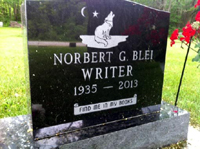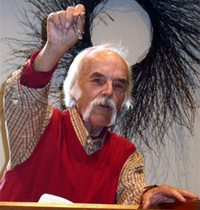
Poetry Dispatch No. 313 | February 22, 2010
Bertolt Brecht
Brecht, it seems to me, still remains under the radar in this country. Invisible. An enigma of sorts. Much of this dealing with his Marxist politics, no doubt, though he lived here in exile from 1941 to 1947 — escaping Hitler, Nazi Germany. And wrote three of his best known plays at that time: Mother Courage, The Caucasian Chalk Circle, and The Life of Galileo.
I can’t recall any student in the past twenty years telling me he studied or was taught Brecht in college. I suspect most college students, English majors today even know his name—with the possible exception of theater arts majors. (And some may have heard the music, his songs, or have seen a production of his world famous “The Three Penny Opera”, in collaboration with Kurt Weill, and/or “The Rise and Fall of the City of Mahagonny.”
Poet, playwright, theater director, social critic…his cause was relentless. His voice, heard throughout Germany, Europe, and pockets of America, perhaps.
His poems, not that well known, are rock bottom real…flinty: the common tongue wagging uncomfortable images/ideas to ponder, entering the reader’s psyche, harboring there a long time…Don’t you see? Do something. Be something. —norbert blei
THE BURNING Of THE BOOKS
When the Regime commanded that books with harmful knowledge
Should be publicly burned and on all sides
Oxen were forced to drag cartloads of books
To the bonfires, a banished
Writer, one of the best, scanning the list of the Burned, was shocked to find that his
Books had been passed over. He rushed to his desk
On wings of wrath, and wrote a letter to those in power ,
Burn me! he wrote with flying pen, burn me! Haven’t my books
Always reported the truth ? And here you are
Treating me like a liar! I command you!
Burn me!
BAD TIME FOR POETRY
Yes, I know: only the happy man
Is liked. His voice
Is good to hear. His face is handsome
The crippled tree in the yard
Shows that the soil is poor, yet
The passers-by abuse it for being crippled
And rightly so.
The green boats and the dancing sails on the Sound
Go unseen. Of it all
I see only the torn nets of the fishermen.
Why do I only record
That a village woman aged forty walks with a stoop?
The girls’ breasts
Are is warm as ever.
In my poetry a rhyme
Would seem to me almost insolent.
Inside me contend
Delight at the apple tree in blossom
And horror at the house-painter’s speeches.
But only the second
Drives me to my desk.
READING THE PAPER WHILE BREWING THE TEA
In the early hours I read in the paper
of epoch-making projects
On the part of pope and sovereigns, bankers and oil barons.
With my other eye I watch
The pot with the water for my tea
The way it clouds and starts to bubble and clears again
And overflowing the pot quenches the fire.
[from Bertolt Brecht, Poems 1913-1956, Routledge, 1987]






























































When I was figuring out how to write my 100 so-called poems, I read thru a Collected Poems of Bertolt Brecht, I think it was called—among many other books, looking for a way to do something similar to what Brecht was trying to do. He was being a columnist, without a column—that’s like being a minister without portfolio, church, or congregation.
I found a lot to like. But I think he was concentrating more when he wrote his plays, &, less when he wrote most of the poems. So that, as with most of what I sifted thru, I found some useful leads, but not a leader.
For instance, he continues, as most modern & contemporary poets, too, do, to break his lines in inexplicable places, a kind of game of hide & seek with the reader. The last thing I want to do with the reader is play hide & seek. I want the reader to know exactly what I mean, to be as clear as possible, &, therefore, to be damned sure I’m saying what I intend to say, that it’s not otherwise being said, & that it’s truly useful.
These are tough times, & getting tougher—for most of us. You either want to be truly useful, or you want to provide a real escape, like a bottle of whiskey or shot of heroin—& I’m not in the escape business.
Likewise, when you break sentences up in the middle, or approximately randomly, starting each line with a capital letter is a distracting atavism.
But Brecht was trying to affect events, by affecting attitudes, & so am I—while so many are, rather, creating divertimentos—distractions, escapes—an entirely different, & antagonistic activity.
Thanks for sharing the Brecht poems, & your ruminations on his work &, particularly, his work & American readers.
When you do write poems about subjects such as Brecht chose, as I do, you quickly find that most venues are closed to you, as most classrooms are still closed to Brecht. He was a communist, I’m not—but both of us threaten orthodoxies, including the orthodoxies—& self-esteem—of the literati.
Most in the poetry “community”—or, rather, intersecting & overlapping networks—want little to do with serious politics or social insight—with the exception of a few points of view that are kosher among them, which they flash like membership cards—“we’re the enlightened ones.”
Pity, because what better way for a columnist to present his or her commentary than in something like a poem?—or what I call so-called poems.
Incidentally, I don’t mean to suggest that I’m writing the kinds of slight, superficial pieces that most political columnists, operating within the acceptable, narrow, left-of-center/center/right-of-center/pathologically right-wing spectrum, wrote, & continue to write, or promulgate on television or radio. What I’m attempting to deliver is spiritual & mental & psychological barrels of oil, depth charges, vehicles, bivouacs, algorithms, refuges from madness that aren’t themselves madhouses, or disabling—that are, rather, enabling—so you can move on beyond the refuge, not wallow in it the rest of your days.
I’m always glad when I can get what I’m getting across cleverly—that’s fun—but it’s never the main thing.
I read some of these reviews and they are brief, yet sufficiently informative to provide a solid background on these authors and their work. I especially like the format of your site and how you are able to fold so many books into what seems to be a short blog roll.
I plan to visit your site regularly, it is so easy to use.
HAQ1
Interesting to read Eric’s thoughtful commentary. A friend, a fellow Wisconsinite, a writer I have read for many years but met only twice–each time, eventful, compelling, beyond enjoyable. A sizzling conversationalist. I’ve said before and repeat: definitely a man/writer on a mission–to save the world. One of the good guys we especially need in this, our hour upon the stage. Brechtian, for sure. Ironically, while reading/rereading much of Brecht’s collected poems last week in preparation for this posting, the ‘news poetry’ of Eric Chaet, his philosophy of human engagement came to mind more than once. I wish the hell he had Brecht’s stage, a large publisher, a million readers. I’m grateful he’s out there, holding down the fort with ‘radical’ thoughts, fiery words. I always await his ‘head’-lines…his latest news from the invisible front.
Not sure about Brecht’s poesy, but Three penny opera, Mother Courage, or Mahagonny, running indefinitely , like in small towns across Merica might do some good, or at least improve on sunday schools. Or maybe stage ’em in brothels (as was done in Weimar days, ich denke)
‘An die Nachgeborenen’ is another great poem of his. Its message only seems to ring truer with the years…
[…] for his contributions to theater, he is also considered to be one of the greatest German poets that ever […]